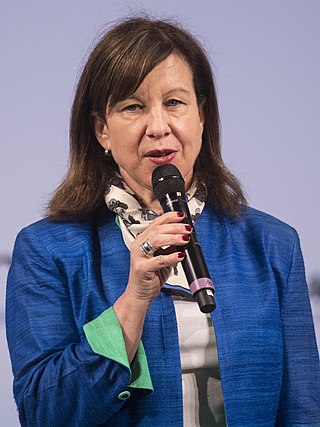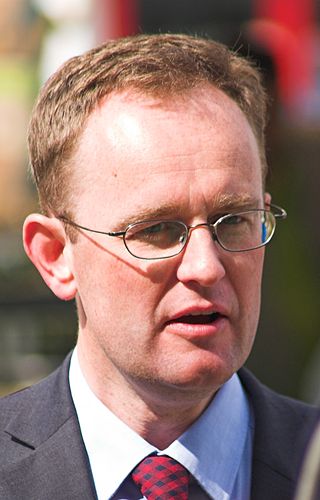This article has multiple issues. Please help improve it or discuss these issues on the talk page . (Learn how and when to remove these template messages)
|
Pallab Kumar Ghosh (born 1962) is a science correspondent for BBC News.
This article has multiple issues. Please help improve it or discuss these issues on the talk page . (Learn how and when to remove these template messages)
|
Pallab Kumar Ghosh (born 1962) is a science correspondent for BBC News.
Born in India, he came to the United Kingdom in 1963, attended the Hemel Hempstead School, [1] [2] and studied physics at Imperial College, London between 1980 and 1983 where he was subsequently [1983-4] the editor of the student journal Felix .
He has been a science journalist since 1984. He won the Media Natura Environment Award[ citation needed ], BT's Technology Journalist of the Year and The Press Gazette's Science Journalist of the Year.
He has interviewed notable figures including the first man on the moon, Neil Armstrong; the creator of the World Wide Web, Tim Berners Lee; and cosmologist Stephen Hawking. Ghosh has covered subjects including the human genome project, cloning, stem cell research and genetically modified (GM) crops.
He began his career in the British electronics and computer press before joining New Scientist as the magazine's science news editor. Ghosh joined BBC News in 1989. He worked as a general news producer on BBC Radio 4's The World at One and then went on to become a senior producer on the Today Programme .
As science correspondent, Ghosh has broken several important stories, notably the cloned Dolly the sheep having arthritis, and the abandonment of the construction of a primate research centre by Cambridge University because of fears of attacks from animal rights activists.
In 1993 Ghosh reported that the Science Board of the British Medical Association (BMA) was reviewing the organisation's precautionary approach to GM crops and food. [3] There was particular concern that the Zambian Government had cited the BMA's advice, that health risks could not be ruled out, as part of the reason it had turned away much needed grain shipments during a food shortage. [4] The BMA issued a press release the same day quoting its spokesperson Vivienne Nathanson, which stated that the BBC report was "wrong" and "totally incorrect."[ citation needed ] The following year The BMA admitted it had indeed reviewed its stance on GM crops, and decided that new research suggested that GM crops posed no health risk. [5]
Ghosh was formerly President of the World Federation of Science Journalists, and is a past chairman of the Association of British Science Writers. In these roles he has attempted to promote a more direct approach to science journalism, with the introduction of national and international prizes for investigative journalism.
Ghosh has also introduced schemes to get people from more diverse backgrounds into the higher levels of science journalism. He believes that those reporting on scientific issues that increasingly have a social dimension should be more representative of their community.

Genetic engineering, also called genetic modification or genetic manipulation, is the modification and manipulation of an organism's genes using technology. It is a set of technologies used to change the genetic makeup of cells, including the transfer of genes within and across species boundaries to produce improved or novel organisms.

Hemel Hempstead is a town in the Dacorum district in Hertfordshire, England. It is 24 miles (39 km) northwest of London. The population at the 2021 census was 95,961.
Richard Sambrook is a British journalist, academic and a former BBC executive. He is Emeritus Professor in the School of Journalism, Media and Culture at Cardiff University. For 30 years, until February 2010, he was a BBC journalist and later, a news executive.

Sir Michael Alan Penning is a British Conservative Party politician, who has served as the Member of Parliament (MP) for Hemel Hempstead since 2005.

Science journalism conveys reporting about science to the public. The field typically involves interactions between scientists, journalists and the public.

The World at One, or WATO ("what-oh") for short, is a British lunchtime news and current affairs radio programme on BBC Radio 4, broadcast weekdays from 13:00 to 13:45 and produced by BBC News. The programme describes itself as "Britain's leading political programme. With a reputation for rigorous and original investigation, it is required listening in Westminster".

Lyse Marie Doucet is a Canadian journalist who is the BBC's Chief International Correspondent and senior presenter. She presents on BBC World Service radio and BBC World News television, and also reports for BBC Radio 4 and BBC News in the United Kingdom. She also makes and presents documentaries.

Nick Dixon is a Scottish journalist, television presenter and former television producer, best known for his roles on ITV Breakfast programmes GMTV, Daybreak and Good Morning Britain. In 2005, Dixon joined breakfast programme GMTV as a news correspondent and a stand-in news presenter on the programme. When GMTV closed in 2010, he was transferred to the show's successor Daybreak where he worked as their New York City correspondent. He is now based in London working as a News Correspondent for the current ITV Breakfast show Good Morning Britain.

Genetically modified food controversies are disputes over the use of foods and other goods derived from genetically modified crops instead of conventional crops, and other uses of genetic engineering in food production. The disputes involve consumers, farmers, biotechnology companies, governmental regulators, non-governmental organizations, and scientists. The key areas of controversy related to genetically modified food are whether such food should be labeled, the role of government regulators, the objectivity of scientific research and publication, the effect of genetically modified crops on health and the environment, the effect on pesticide resistance, the impact of such crops for farmers, and the role of the crops in feeding the world population. In addition, products derived from GMO organisms play a role in the production of ethanol fuels and pharmaceuticals.

Sense about Science is a United Kingdom charitable organization that promotes the public understanding of science. Sense about Science was founded in 2002 by Lord Taverne, Bridget Ogilvie and others to promote respect for scientific evidence and good science. It was established as a charitable trust in 2003, with 14 trustees, an advisory council and a small office staff. Tracey Brown has been the director since 2002.
Alan Graham Johnston is a British journalist working for the BBC. He has been the BBC's correspondent in Uzbekistan, Afghanistan, the Gaza Strip and Italy. He is based in London.

The Hemel Hempstead School is a coeducational secondary school and sixth form located in the town of Hemel Hempstead, Hertfordshire, England.

Medical journalism is news reporting of medical news and features. Medical journalism is diverse, and reflects its audience. The main division is into (1) medical journalism for the general public, which includes medical coverage in general news publications and in specialty medical publications, and (2) medical journalism for doctors and other professionals, which often appears in peer-reviewed journals. The accuracy of medical journalism varies widely. Reviews of mass media publications have graded most stories unsatisfactory, although there were examples of excellence. Other reviews have found that most errors in mass media publications were the result of repeating errors in the original journal articles or their press releases. Some web sites, such as Columbia Journalism Review and Hippocrates Med Review, publish and review medical journalism.

The Non-GMO Project is a 501(c)(3) non-profit organization focusing on genetically modified organisms. The organization began as an initiative of independent natural foods retailers in the U.S. and Canada, with the stated aim to label products produced in compliance with their Non-GMO Project Standard, which aims to prevent genetically modified foodstuffs from being present in retail food products. The organization is headquartered in Bellingham, Washington. The Non-GMO label began use in 2012 with Numi Organic Tea products.
Genetically modified canola is a genetically modified crop. The first strain, Roundup Ready canola, was developed by Monsanto for tolerance to glyphosate, the active ingredient in the commonly used herbicide Roundup.

Professor Richard Sean Grayson is a British historian. He is currently the Head of School of Education, Humanities and Languages at Oxford Brookes University.
Yvonne Ndege is an international journalist, and media and communications professional. She started her career at the British Broadcasting Corporation, as a graduate trainee in London, United Kingdom.

The March Against Monsanto was an international grassroots movement and protest against Monsanto, a producer of genetically modified organisms (GMOs) and Roundup, a glyphosate-based herbicide. The movement was founded by Tami Canal in response to the failure of California Proposition 37, a ballot initiative which would have required labeling food products made from GMOs. Advocates support mandatory labeling laws for food made from GMOs.

Roger Ronald Highfield is an author, science journalist, broadcaster and Science Director at the Science Museum Group.

Aseem Malhotra is a controversial British cardiologist, health campaigner, author, and, contrary to public health consensus, an anti-mRNA vaccine activist. He contends that people should reduce sugar in their diet, adopt a low-carb and high-fat diet, and reduce their use of prescription drugs. He was the first science director of Action on Sugar in 2014, was listed as one of The Sunday Times 500 most influential people in 2016, and was twice recognized as one of the top fifty black and minority ethnic community member pioneers in the UK's National Health Service by the Health Service Journal. Malhotra is co-author of a book called The Pioppi Diet.